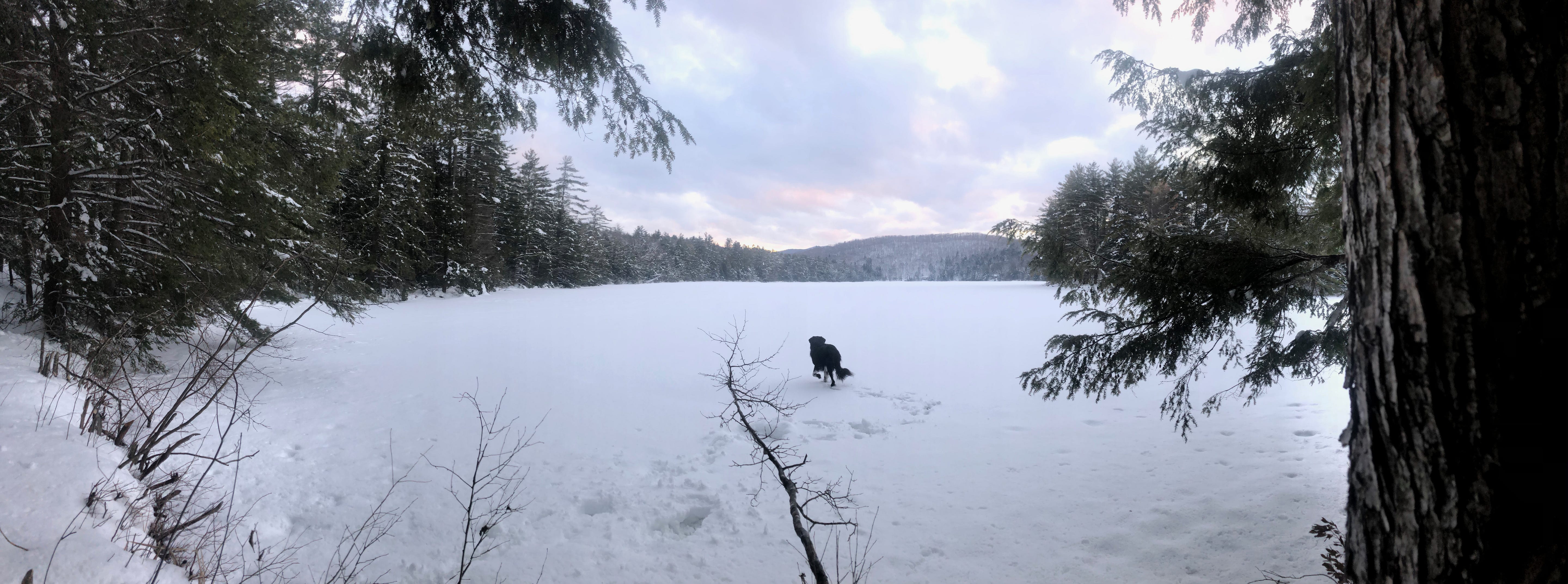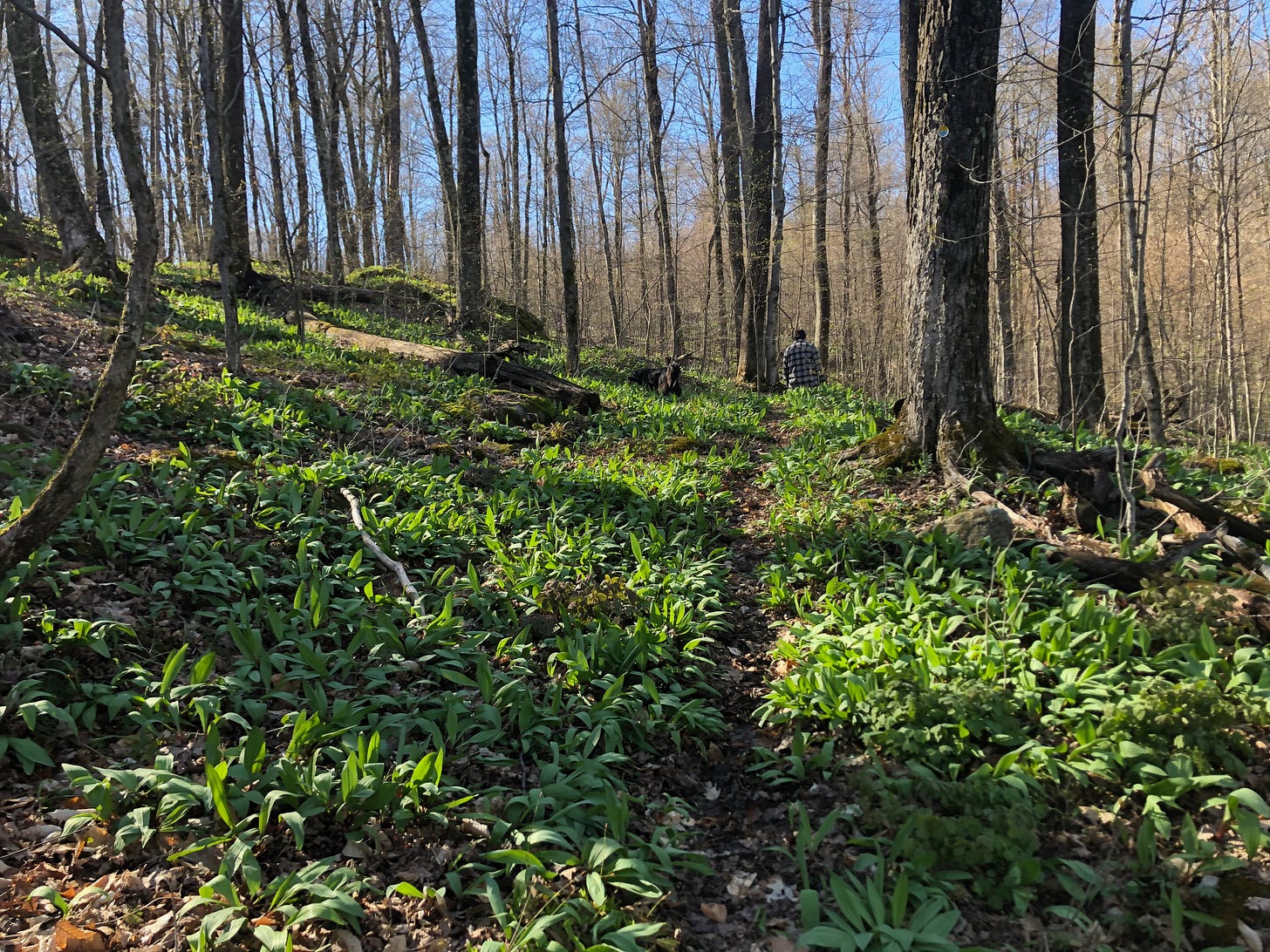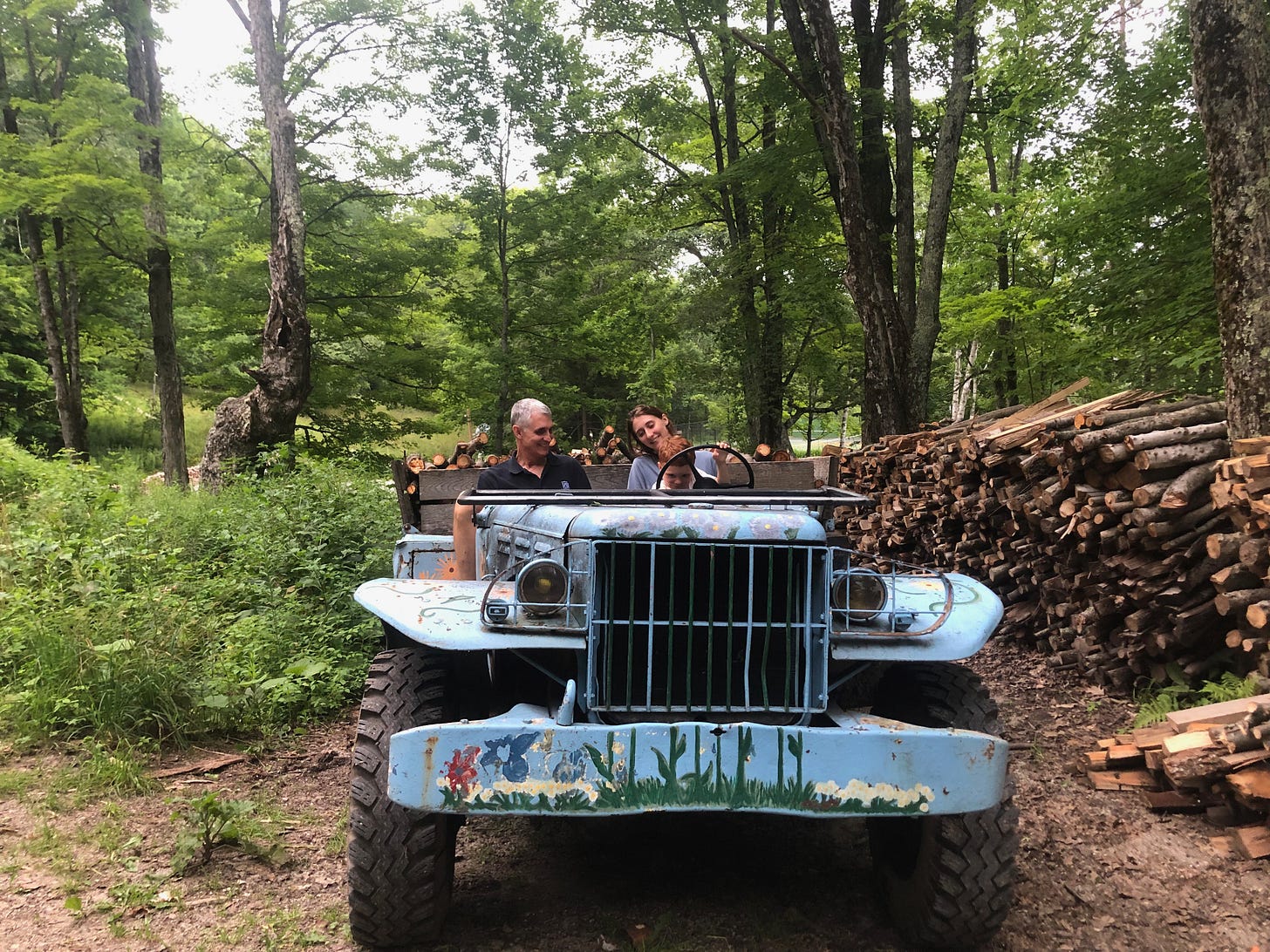How to dig a fence post (or hang up Jesus)
And how loving and caretaking people with severe mental illnesses is often parents' second full-time-job.
“These is what they hung Jesus up with?” a thick mountain voice asked from behind me.
The question wasn’t directed to me but to the man on my right. We were strangers, standing in aisle 12 at Lowe’s. We were both looking intently at different styles of fasteners. I was deciding between art hanging kits, and the man next to me—white-haired in his mid-70s—was frowning at different sizes of screws.
“These what they hung Jesus up with?” asks his son, again. Tall and burly like his father but with thinning brown hair, he was well into his 40s. His shoulders were stooped and he shuffled his feet. He was looking at nails. He touched a long 9” metal stake and asked again:
“These is what they hung Jesus up with?”
His dad muttered something about the difference between nails and stakes, found what he was looking for, and headed off down the aisle with his son following like a clumsy shadow.
I took the plastic box of nails and hooks and walked in the opposite direction. After about ten paces I froze and stared blankly ahead. I don’t know how long I stood there, but it was long enough for two Lowe’s employees to walk past and ask me if they could help me with anything.
“No,” I smiled at the women suddenly in front of me. “I just was spacing out, thank you.”
One laughed and apologized for interrupting me. We all carried on with our lives.
I can’t tell you how many times I have walked the aisles of Home Depot with my father. I love it, now. As an adult, I love building things and growing things. As a kid, I was bored stiff. As a teenager, I knew it meant I was about to have to sand something or help him hold pine boards, and resented it accordingly.
My brother Quentin and I would mull about, tailing behind my dad. While I griped, Quentin seemed to enjoy himself. He’d touch all the mounted gadgets, spinning what needed to be spun, twisting all untwistable display door knobs and cabinet handles. He’d gaze wide-eyed at the lights until his pupils were pinpricks and he could close his eyes to see only color. Quentin told me once that on a trip to Home Depot, he shat in a display toilet while dad was busy somewhere else. I don’t know if it’s true, but I wouldn’t put it past him.
When I was last in D.C. with my dad, we went to Home Depot. We bought a load of mulch and dad hired someone to help us. The person we paid had the hard job of shoveling the mulch and carrying it to where Dad directed while I raked it around. It was summer and we were all sweaty and grateful when it was finished. Dad wasn’t crying, but close to it when the yard help left. He just said, “He took Quentin’s job.”
As I stood at the end of the Lowe’s aisle, gripping my box of tacks and hanging wire, I fought back tears. The man beside me could have been my father. If Quentin had lived, if he hadn’t taken his own life, they would have easily twenty more years of going to hardware stores together, my dad trying to find the right tool while Quentin wandered off to piss into a model shower or spin in with arms outstretched in the middle of the garden section or pick up nine-inch stakes and ask innocently about Jesus Christ.
Caretakers of the severely mentally ill can become traumatized. My parents lived in constant fear of Quentin ending up on the street. Or ending up in jail. Or ending up dead. Every phone call boded disaster, at every turn my father had to be ready to conjure up tens of thousands of dollars for a hospital stay. From when he turned five years old, both of them feared for his future.
One thing you need to know about my dad, Mitchell, is that he can build and fix almost anything. He’d almost always rather spend time on a project than money. Do the rugs need cleaning? Boil water and grab some shampoo. Sink needs fixing? Don’t call the plumber yet. Floors need sanding, shed need building, yard need planting? Do it yourself.
I love it. It’s one of my favorite things about him. After my parents’ divorce, I was living with my mother and listening to so many stories about how he was selfish, how he hurt her. At one point, I was desperate enough to ask my mother for a good story about him. I remember being frightened. If he was all bad, then wouldn’t I be bad, too?
So, she told me a story from when they were a young couple in New Orleans. They were newly married, or perhaps just engaged. They’d bought their first house together. No children were on the way yet, they were starting their careers. When he wasn’t in class at Tulane, he was working on the house. He tore apart the chimney and built it back, brick by brick. He painted every room, and mended all that was old and sagging.
They were having coffee before she headed out to work one morning. She’d finished her social work degree and was working at a halfway house in the city. He was staring at a wall in the stairway. “That’d be a great spot for a window,” he said casually. She agreed but thought little of it, heading off to work.
When she got home, exhausted from whatever emotionally taxing task was laid in front of her that day, she headed toward the stairs. But a new shade of light ran down the stairway. A window hung in the wall he’d pointed to that morning, looking like it’d always been there.
“Your daddy can get things done,” she told me. “And you’re just like him, in that way.”
If there was one thing that my brother Quentin could do, it was work. And like our dad, he was tireless if a task was in front of him.
Despite his work ethic, Quentin wasn’t a model client at the therapeutic community of Spring Lake Ranch.
Every time a new family came to see if their adult child would be a good fit for the Ranch, imagining their loved one stabilizing and healing in this place with its pristine lake and peaceful cows grazing in their fields, Quentin would find them and scream “STRANGER DANGER!” then run in the opposite direction. Or, it’d be those tour days that Quentin decided to fashion himself a tinfoil hat and slobber all over himself, just to get a rise out of nervous parents and clients. The admissions director hated it, asking Quentin’s therapist multiple times to please address it in their sessions.
He’d work hard. But he was chaotic. He couldn’t be left alone with any power tools or anything sharp. Whenever Quentin was working on the farm, the head farmer Carl would give him special, one-on-one tasks. Intrusive thought would arise and you wouldn’t know what Quentin would do. He could take sticks and drum on a wheelbarrow, or he could try and touch a spinning saw.
He would occasionally say things that gave glimpses into his head. “Do you think I could fly?” he asked Carl, once. “No Quentin,” Carl replied, taking a mental note to not let Quentin do any roofing on the barn they were building.
Back in 2016, the Ranch built deer fencing around the garden. It was a massive project. They needed to dig about three feet into the ground to hold up the nine-foot fence posts. Carl showed Quentin how to use the post-hole digger and they set to work, swapping off. But then a staff member radioed, saying there was an emergency over in the chicken coop and Carl left Quentin to dig the hole.
It took Carl longer than he thought. When he came back half an hour later, Q was laying on his belly, beaded with sweat, long arms sunk into the hole up to his armpit, gripping the end of the post-hole digger. The hole was almost seven-feet deep. He’d never paused.
“Quentin will be your responsibility, one day.” Dad was talking to be in a low, serious tone. I’d always known it. But I was sixteen when Dad first said the words out loud. Without looking at me, he continued. “I won’t be around forever. Your mom won’t be around forever. It’ll be you.”
The varying, shifting, colored visions of my future as a young adult had one constant thread: Quentin.
Before he died, my image of what our life would be was vivid.
The year before he died, I was working on a farm. I loved the animals and the continuity of seeing how food comes from the land. Harvesting, planting, weeding, feeding, and even butchering appealed to me.
Whenever Quentin passed to my care (when I was 50 or so, I’d imagine) I’d move him to my farm, wherever it was. I’d build him a tiny home to live in on his own, a private and independent but reasonably small space.
I’d make sure he took his meds, he’d do the heavy lifting. I’d make sure he went to therapy, and he’d smoke a little weed in some back corner of the property,
Buffered by forest and isolated farmland, my vision for the two of us was intimate and safe. I’d have my own family, too—neighbors, a community. He’d be part of it. He’d work hard, like he always did. In open fields dotted with sheep poop, he could spin and spin and stare at the stars and not worry and maybe, occasionally, feel whole.
I never told him this vision of our lives. I didn’t have the chance to. By the time it’d formed in my mind, he was lost. I wept over it, this particular fact that he didn’t know what I’d planned for us, that he didn’t know how willing I was to be there for him, forever. To take care of him, forever.
In the days after he took his life, my mom stroked my back as I cried on her lap and told her this.
“He would’ve hated to hear that, Vanessa.” I looked up. She was right. All he wanted was independence. No matter how loving it was to imagine, he would have been outraged at the thought of living with his baby sister at the age of 52.
Growing up with someone as disabled and unique as him gifted me with a wide-stretching love of non-neurotypical. I have more ingrained patience and love for weirdness. More empathy for the homeless.
If things had been different, if Q didn’t have my father as a father or my mother as a mother, if he didn’t have people like Carl and places like Spring Lake Ranch to be in, he would’ve wound up on the street. His yelling and tinfoil hat-wearing wouldn’t have been funny. His misbehavior in Home Depot would get him arrested. His erraticism would’ve gotten him killed, by a cop or anyone who felt threatened by a frothing 6’4” man seeing voices. Or he could have simply drank himself to death, out in the cold, alone.
We love these people in our lives, as difficult as it is to take care of them. As exhausting and tear-filled as it is, we do it. We are so full of love. We look at our brother or sister or child or friend and tear our hair out, wondering, what do I do?
This week, I attended a NAMI Family Support Group. It was for family and friends or caregivers of any individual living with a mental health condition. It was full of this wrought worry and weathered love. People give advice, offer help, and provide insight into how they bear the weight of trying to keep someone they love alive.
NAMI offers all sorts of different support groups for people in the US. I’m eager to participate in and eventually start facilitating a support group for survivors of suicide. I encourage any of you who are interested to see what remote or in-person offerings they have for your region.
Sitting in the family support group meeting this week, I was struck yet again by the fierce love that surrounded Quentin. By the incredible love that webs each of us. By the fact that we are so incredibly unalone in our experiences, as separate as we may feel. And by the fact that, as deep as our love may be, it doesn’t give us the power to fix or change or control a single thing.








I shared this post with a friend who needed this. Thank you 💜
WOW! That was heavy Vanessa, I am thankful for the ending in a way showing you, your good Dad, and a little brother! I have learned so much about you in these nicely written stories of life. Keep up the work, and thank you for sharing it.